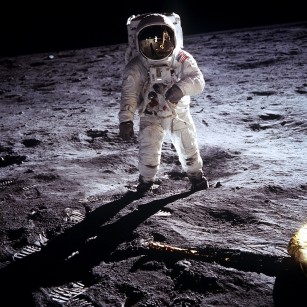Roadmap to becoming an Aeronautical Engineer


The people at the National Aeronautics and Space Administration (NASA) probably took Frank Sinatra’s evergreen song ‘Fly Me to the moon’ very seriously and decided to land on the moon. 53 years ago, on this day - 20 July 1969 - two men who would go down in history, became the first people to set foot on the moon. These were Neil Armstrong and Buzz Aldrin. While they landed the moon rover on the lunar surface, their co-pilot, Michael Collins stayed back to man the Apollo 11 spacecraft. The day is today celebrated internationally as Moon Day. Countless generations have been inspired by their amazing feat since - with many youngsters wanting to become astronauts when they grew up.
But the fact remains that behind the two men who we all remember was a huge team of engineers, experts, researchers and scientists who worked together to make this possible. We are talking about the field of aerospace or aeronautical engineering.
Are you someone who has often looked up at the night sky and wondered what lies beyond the dark blue horizon? Have you read or watched documentaries about the moon landing and aspired to be an astronaut? If so, this aeronautical or aerospace engineering is just the field for you.
What is aeronautical engineering?
The science of developing, producing, testing, and maintaining flight-capable devices is known as aeronautical engineering. Satellites, jets, space shuttles, helicopters, military aircraft, and missiles are all examples of such devices, and part of fields where aeronautical engineers play key roles.
Engineers that specialise in aeronautics are also in charge of researching and creating new technologies that improve the functionality and efficiency of aircraft and other moving vehicles.
Educational Qualifications
If you are considering a career as an aeronautical engineer, these are the educational requirements you need to meet:
Skills Required to Become an Aeronautical Engineer
Here are a few skills that are a must for anyone looking to pursue a career in aeronautical engineering.
Career Opportunities
The expansion of space mission initiatives and the necessity to create new space equipment over the past ten years have made the area of aeronautical engineering challenging and provide a wide range of job opportunities in the following industries:
The landing on the moon was not just a narrative of scientific brilliance and competence, but also of the human mind's constant search for the unknown and our need to venture beyond our native home, and our surroundings, to conquer distant alien worlds. Besides this, Aeronautical Engineering also provides students with comprehensive and in-depth instruction in areas such as missile development and manufacture. In the field of defence and space research as well, they are in high demand because they can develop, test, and contribute to the manufacturing of new space equipment.